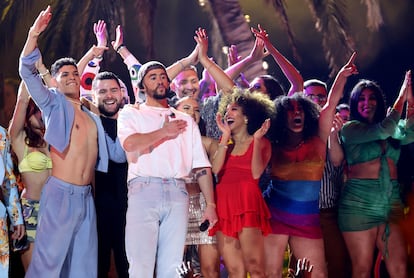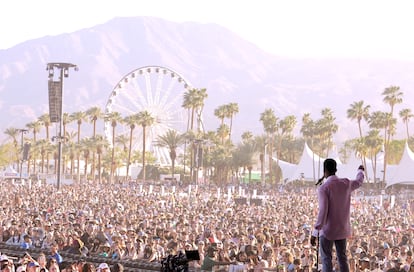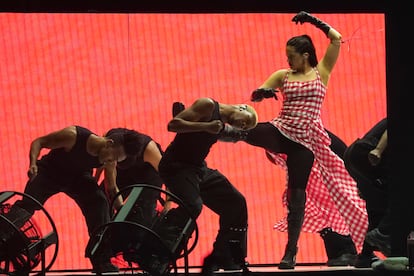Spanish-language music showcases its clout in US with Bad Bunny and Rosalía rocking Coachella
The Puerto Rican opens the huge musical event this Friday and the author of ‘Motomami’ will be performing on Saturday


While the world was locked down, the U.S. was opening up to Spanish-language music. Part of the Puerto Rican artist Bad Bunny’s worldwide success is rooted in the pandemic, with the musician releasing three albums by the end of 2020: YHLQMDLG, Las que no iban a salir and El último tour del mundo. When everyone started to emerge from their homes, Benito Antonio Martínez Ocasio — which is his real name — was by then a star. In 2021, he was the most listened to artist on Spotify, reaching more than 9 billion plays — all without releasing a new album. His stardom was enhanced by the release of Un verano sin ti, an album that propelled him to further success with two international tours spanning 81 dates, which saw him bring in more than $435 million in one year, breaking a 2018 record set by Ed Sheeran. These credentials earned Bad Bunny a headlining slot at Coachella, the most prestigious festival in the United States, which gets underway this Friday in the California desert and will run through Sunday, April 23.
Spanish-language music is on the rise, with revenues now accounting for 7% of the total industry sales in the U.S., the highest figure ever. In 2022, it generated $1.1 billion in the country, up 24% on the previous year. Mostly, this record is the result of the boom in reggaeton, urban genres and regional Mexican (a Grammy Award category created in 2013 that encompasses banda, norteño and Tejano music).
The Spanish language will not only be out in force at this edition of Coachella on account of Bad Bunny. Rosalía will also be gauging her popularity on Saturday night alongside Blackpink, the quartet who wrote their name into the history books in 2019 by becoming the first K-Pop outfit to perform at Coachella.

Latin artists have appeared at Coachella since the very first edition in 1999. Venezuelan band Los Amigos Invisibles, whose earliest fans included Talking Heads’ David Byrne, were in that first ever lineup. Since then, new genres have gradually replaced rock and pop music. Los Fabulosos Cadillacs, one of the longest running Argentine bands, will be performing for the first time at the festival, on Sunday at 2:30 p.m.
Other Latin artists have also established themselves at Coachella. Becky G, a Los Angeles singer born into a Mexican-American family, will be performing on Friday afternoon on the main stage. The 26-year-old first began working at a young age as a dubbing actress and singing R&B songs that she would later upload to YouTube. She was signed by a record label at the tender age of 14. A decade ago, Becky G sang at Coachella with DJs from Monterrey and last year she performed alongside the Colombian Karol G, who has gained global stardom. Both artists sang “Mamiii,” a tune that broke into the top 20 on the Billboard Hot 100 chart and garnered Becky G a Latin Grammy nomination for Best Urban Song (won by Bad Bunny’s “Titi me preguntó”). Colombia’s Kali Uchis will also be on stage Sunday in her return to Coachella (she performed in 2018).
Artists who will be gracing the festival’s audience for the first time include Puerto Rican Eladio Carrión, who recently released 3MEN2 KBRN, (which reads as “tremendo cabrón,” “complete bastard” in English), which is poised to become one of the most listened to trap albums of the year on the strength of his collaborations with Lil Wayne, Future, 50 Cent, and Bad Bunny. Despite only being released less than a month ago, his songs have already accrued several million plays.

This is one of the most diverse editions of Coachella. In addition to Bad Bunny, who previously performed at the festival in 2019, the above-mentioned Korean act Blackpink will be there to round off Saturday’s lineup, along with the rapper Frank Ocean, who will be performing on Sunday. This will also be the first occasion when none of the headliners are white. The organizers had been set to break this trend in 2020, when they announced Ocean, Travis Scott and Rage Against The Machine, but the outbreak of Covid-19 led to the cancellation of that year’s edition. Indeed, this means that Ocean’s appearance on Sunday is eagerly awaited. It will be the first concert in six years for the elusive writer of Channel Orange and Blonde.
Coachella will attract some 125,000 fans during its six days (the event beginning this Friday will be repeated on April 21, 22 and 23 and broadcast on YouTube). The festival will be staged near Indio, a city located 215 kilometers east of Los Angeles. In the 1970s, the valley was an agricultural land where Latin immigrants harvested grapes in a desert-like climate. The abuse endured by vineyard workers, who only lived until 49 years of age on average, due to exposure to pesticides, and earned paltry wages, prompted the legendary activist César Chávez, who fought to unionize the workers, to come to the area.
However, that is a thing of the past, as nowadays, Coachella is the pilgrimage site of the largest pop festival in the United States. The event takes place on a polo field and the cheapest ticket costs
$500, rising to $6,000 with accommodation and a VIP package. The brand is owned by Golden-voice, a company that belongs to the conglomerate of Denver-based conservative tycoon Philip An-schutz, who has a fortune of around $10 billion, according to Forbes magazine’s list. Every year Coachella pulls in more than $114 million, making it one of the most profitable festivals in the world.
Sign up for our weekly newsletter to get more English-language news coverage from EL PAÍS USA Edition
Tu suscripción se está usando en otro dispositivo
¿Quieres añadir otro usuario a tu suscripción?
Si continúas leyendo en este dispositivo, no se podrá leer en el otro.
FlechaTu suscripción se está usando en otro dispositivo y solo puedes acceder a EL PAÍS desde un dispositivo a la vez.
Si quieres compartir tu cuenta, cambia tu suscripción a la modalidad Premium, así podrás añadir otro usuario. Cada uno accederá con su propia cuenta de email, lo que os permitirá personalizar vuestra experiencia en EL PAÍS.
¿Tienes una suscripción de empresa? Accede aquí para contratar más cuentas.
En el caso de no saber quién está usando tu cuenta, te recomendamos cambiar tu contraseña aquí.
Si decides continuar compartiendo tu cuenta, este mensaje se mostrará en tu dispositivo y en el de la otra persona que está usando tu cuenta de forma indefinida, afectando a tu experiencia de lectura. Puedes consultar aquí los términos y condiciones de la suscripción digital.








































